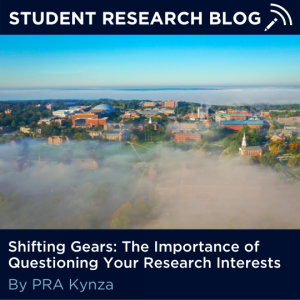 By Kynza Khimani, Peer Research Ambassador
By Kynza Khimani, Peer Research Ambassador
When people talk about their research experiences, they often focus on the positives. But what do you do when your research experience is not what you expected it to be? What if your academic interests and career goals have shifted?
If you find yourself asking one of these questions, then you may be able to relate to my research journey. In my sophomore year, I was a Physiology & Neurobiology major on the pre-pharmacy track, looking to get involved in neuropharmacological research at the UConn School of Pharmacy. I had read substantial information about the mechanisms of substance use disorder (SUD) and was eager to work in a lab that sought to develop therapies for SUD. At this point in my academic career, I was also applying to the School of Pharmacy and was convinced that this was the career path for me.
All of this shifted over the course of a few months. In March of 2020, the COVID-19 pandemic gave me a little too much time to think about my future. Having worked at a pharmacy for almost a year and realizing that I did not enjoy the experience, I found myself questioning why I had applied to pharmacy school in the first place. Long story short, after a lot of introspection, research, and conversations with numerous health professionals, friends, family members, and faculty, I decided that pharmacy school was not the right path for me.
Flash forward a few months, and I was back at UConn, in the middle of my junior year. Though I was no longer a pharmacy major, I continued pursuing my Physiology & Neurobiology degree, and naturally continued working in the lab I was in before. Though I was learning so much about the underlying mechanisms behind substance use disorder and basic lab techniques, I found myself asking further questions about the pathologies of the brain, and the extent to which they are caused by societal and
environmental factors.
That semester, I was taking a course called Public Health & Healthcare Policy, which solidified my interest in the social determinants of health and developed a newfound curiosity in public health research. What did public health research look like on campus? Were there opportunities for undergraduates to get involved?
With these questions in mind, I began speaking with faculty who had expertise in Medical Anthropology and Global Health & Human Rights, such as Dr. Sarah Willen and Dr. Cesar Abadia from the Department of Anthropology. Simply meeting with them and learning more about their projects made me understand the importance of their work in a world where factors like race, socioeconomic status, and climate play major roles in access to health care. Through this ongoing exploration, Dr. Abadia asked if I would be interested in his new project studying the experiences of children and families affected by Pediatric Acute-Onset Neuropsychiatric Syndrome (PANS).
Having never heard of PANS before this conversation, I was initially uncertain, but decided to take a leap of faith and say yes. Through reading, transcribing, and qualitatively analyzing interviews with PANS families and children, and l earning of the lack of response from many schools and health care providers to the condition, my interest in global health was amplified, as well as the importance of health advocacy for children and other populations who are often misdiagnosed or underserved.
By Spring of 2021, I had come to love the work I was doing with Dr. Abadia’s research group and wished to devote more time to it through the pursuit of an IDEA grant. I realized that this meant I could no longer work in the lab where I had been since sophomore year, but understood that it was a decision that I had to make for myself. Sometimes, it takes some exploration to understand that something is not right for you.
With that, I encourage you all to take risks, and to not limit yourselves to the pre-constructed notions with which you enter your undergraduate careers. As a PNB major, and pre-pharmacy student, I truly believed that I “belonged” in a lab setting. Without talking to diverse faculty and exploring new experiences, my research trajectory would have been significantly different, and unaligned with my personal interests.
Research is not a one-size-fits-all. Don’t let your major, coursework, or peers determine what your research journey looks like. Figure out what you’re curious about, and ask questions accordingly. After all, isn’t that what research is all about?
Kynza is a senior double majoring in Physiology & Neurobiology and Global Health. Click here to learn more about Kynza.